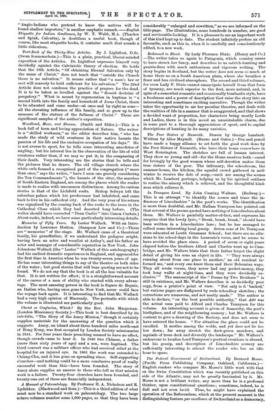In Tennyson Land. By John Cuming Walters. (Redway.)— This is
an attempt "to identify the scenes and trace the in- fluences of Lincolnshire" in the poet's works. The identification is more than doubtful, and Mr. 1-1S3lam Tennyson has pointed out that several of the poems quoted have nothing of Lincolnshire about them. Mr. Walters is painfully matter-of-fact, and expresses his surprise that the lovely lyric, "Break, break, break," should have been written in a Lincolnshire lane ; but he has managed to collect some interesting local gossip. Seven sons of Dr. Tennyson were educated at Louth Grammar School ; but there are no allu- sions to his school-days in the Laureate's verse, and he seems to have avoided the place since. A period of seven or eight years elapsed before the brothers Alfred and Charles went up to Cam- bridge, and Mr. Walters hints that their father forgot the slight detail of giving his sons an object in life. "They were always running about from one place to another,' an old resident in- formed me, and every one knew them and their Bohemian ways. They all wrote verses, they never had any pocket-money, they took long walks at night-time, and they were decidedly ex- clusive.' " The manuscript of the "Poems by Two Brothers" is still in existence, and Mr. Walters describes it as decidedly poor copy, from a printer's point of view. "Not only is it 'backed,' but various pages are disfigured by rude schoolboy sketches ; the corrections are numerous, and not neatly made." The author is able to declare, "on the best possible authority," that /20 was the actual sum paid to Alfred and Charles Tennyson for this volume. An interesting account is given of Somersby, the poet's birthplace, and of the neighbouring scenery ; but Mr. Walters is content to give a drawing of the Rectory, and does not seem to have entered the house. "For situation the place could not be excelled. It nestles among the wolds, and yet does not lie too low down ; far away stretch the dark-green meadows, and myriads of trees deck and diversify the landscape." Mr. Walters's endeavour to localise Lord Tennyson's poetical creations is absurd, but his gossip, and description of Lincolnshire scenery are sufficiently interesting to attract the reader who has an idle hour to spare.


















































 Previous page
Previous page